Local News
While many more Israelis may be thinking of leaving the country, Manitoba has seen very few arrive here the past three years
By BERNIE BELLAN Elsewhere on this website you can read an article about how many Israelis are planning on leaving the country as a result of the radical shift in that country’s direction since the new government came into power (https://jewishpostandnews.ca/rss/alarmed-by-their-countrys-political-direction-more-israelis-are-seeking-to-move-abroad/). We wondered though whether that might lead to an upsurge in Israelis applying to come to Manitoba. If recent figures for the number of Israelis who have come here under the Provincial Nominee Program are any indication, then it seems that the number of Israelis who have been applying to come here has fallen drastically in the past three years.
In May 2022 we published an article about an increase in the number of applicants that Manitoba was going to be able to accept under the Provincial Nominee Program. The PNP is the program through which most immigrants coming to Manitoba arrive. At that time we predicted that the increase – from 6,275 to 6,367, would lead to an increase in the number of Israelis applying to move to Manitoba.
Recently the province announced that its allocation for 2023 under the PNP hds jumped almost 50% – to 9,500.
Yet, while the number of applicants who will be accepted under the PNP may be skyrocketing, it hasn’t translated into any marked increase in the number of Israelis who have applied to move here – either in 2022 or 2023.
We asked a spokesperson for Jon Reyes, Manitoba’s Minister of Advanced Education, Skills and Immigration, the following question: “How many applications under the PNP have you received from Israelis in the past year?”
The answer we received was: “In 2022, the Manitoba Provincial Nominee Program (MPNP) received 16 applications from Israeli citizens. In 2021, the MPNP received 7.”
The spokesperson for the minister also added this note: “I’m not sure if you were thinking those numbers would be larger, but it’s also possible that individuals/families arrive in a different province, and then move to Manitoba. In those instances, that wouldn’t be reflective in the province’s numbers.”
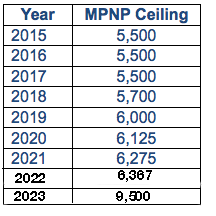
We also emailed the Jewish Federation, asking this question: “I’m wondering whether there has been an increase in inquiries from people living in Israel wanting to know about moving to Winnipeg. The reason I ask is obvious: There are so many Israelis wanting to leave the country now because of what the government is doing, but from what I’ve been reading the vast majority are applying to move to Europe. Is there anything you can tell me about how many have inquired in the past year about moving to Manitoba?”
Here is the answer we got back: “We have not gotten any indication of people leaving Israel and coming to Winnipeg due to the political situation there, at least as of now.”
Between 2017-2019 there had been a steady stream of Israelis who were allowed to move here under the PNP. When COVID hit in 2020, however, the number dropped – for obvious reasons, and it dropped even further in 2021. It increased slightly in 2022 – but nowhere near the levels it had been from 2017-2019.
Following the article we published last May about the Provincial Nominee Program, we received an email from an immigration consultant here who has a great deal of experience assisting Israelis with the process of emigrating to Manitoba. That person suggested that, as a result of the tightening of requirements under the PNP, fewer individuals from Israel were applying to come to Manitoba. We also wrote: “That individual also suggested that many immigrants who have come here have left Winnipeg as a result of not being able to find work in their chosen fields.”
In June 2022 we reported that the Jewish Federation was optimistic that immigration by Jewish families would bounce back in 2022. A spokesperson for the Federation wrote: “We have 75 people ready and willing to come to Winnipeg and continue with the immigration process, and with pandemic restrictions loosening, we anticipate numbers to bounce back from 2021. There are currently 300 individuals in various stages of producing required documents necessary to continue with the process.”
From time to time we have been reporting in this paper about new families having arrived in Winnipeg from other countries, including Turkey and Mexico (and in this issue, from Brazil) – and we will be continuing to report on new arrivals in coming issues, but again, we’re left wondering: Why aren’t more people coming here from Israel?
In our November 9 issue last year we reported on information gleaned from the 2021 census about the number of individuals in Winnipeg who reported that their ethnic origin was Israeli. The figure in the 2021 census was 1,435; in 2016 the figure was only 405. (We also explained that figures from the 2016 census were suspect because that census did not report Jewish or Israeli as one of the choices for ethnic origin. Respondents would have had to write in those answers. In 2021, by way of contrast, respondents were offered a check list of over 100 different choices for ethnic origin – this time including both “Jewish” and “Israeli” as possible answers.)
In either event, there was certainly a marked increase in the number of respondents in 2021 who gave “Israeli” as their ethnic origin.
But, as we also noted in another article (in our November 23 issue) about results of the 2021 census, there were also some very surprising figures about the religious background of individuals who said their ethnic origin was Israeli: “Of the 1350 individuals who said their ethnic origin was ‘Israeli’, only 855 said their religion was Jewish. Of the remainder, 385 said they had no religion, while 105 said they were Christian.”
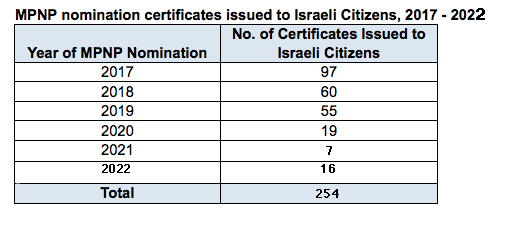
While there have also been a number of arrivals of Jewish families to Winnipeg from countries other than Israel, it’s been Israel that’s been by far the largest source of immigration to this city for Jewish families over the past 20 years.
And, while Winnipeg’s Jewish population showed an apparent increase from 2011 to 2021, when you combine figures for both ethnic origin and religion, the increase was fairly negligible. As I noted in my November 23rd article, a careful analysis of data from the 2021 census showed that, at a maximum, the number of individuals in Winnipeg who might be considered Jewish – either by ethnic origin or religion, was 14, 270 – and the figure was probably much lower than that.
So, what does this all signify? The rate of immigration from Israel to Manitoba has slowed over the past three years – even though the number of applicants who would be allowed to come here under the Provincial Nominee Program has jumped dramatically this year.
But last May, when we spoke with Dalia Szpiro, GrowWinnipeg Director for the Federation, she told us then that there was a large backlog of prospective immigrants who delayed coming here for exploratory visits as a result of Covid. In the past little while many individuals have now been coming here on those exploratory visits, Dalia said at the time.
Evidently though, very few of those prospective immigrants are from Israel – at least if figures released by the Manitoba government showing how few applicants under the PNP in the past two years have been from Israel.
In some respects, what is going on in Israel right now is reminiscent of what was being expressed when Donald Trump was elected President in 2016. Many Americans said then that they would leave the US as a result. While some did come to Canada, it turned out that our immigration requirements were far more onerous than many Americans had thought.
Last May, when we wrote about the PNP, we noted that Manitoba was seeking immigrants in specific areas.
At the time we asked the spokesperson for Minister Reyes: “Are there particular classes of immigrants that Manitoba is wanting to recruit? e.g., computer programmers, nurses, etc. (also good hockey players)?”
The spokesperson responded:
“The MPNP is an economic program that aims to address labour market needs by nominating skilled workers and business investors who satisfy program criteria – and who are employable in their areas of professional experience – across all industry sectors.
“Based on the Manitoba government’s Labour Market Outlook 2021-2025 and recent Manitoba occupations gap analyses for the 2022-2026 period, the need for the following occupations is expected to be acute until 2026, given new and expanding businesses and organizations and replacement of retiring workers:
· Retail salespersons
· Transport truck drivers
· Nurse aides, orderlies and patient service associates
· Retail and wholesale trade managers
· Registered nurses and registered psychiatric nurses
· Food counter attendants, kitchen helpers and related support occu- pations; and
· Elementary school and kindergarten teachers
Many of the immigrants from Israel under the PNP have indeed found work in those areas, especially truck drivers, but one wonders why there has been such a slowdown in applicants from Israel under the PNP?
The answer seems to lie in the tightened requirement that the province is not imposing under the Provincial Nominee Program. Anecdotally, we recall hearing stories from individuals who had come here in the past. In many of those instances, we were told, they came applying to be truck drivers. When asked whether they had experience driving a truck, invariably they would answer: “Yes.” But, we were told, that wasn’t true; no matter, they were accepted under the PNP – and did get jobs as truck drivers.
Apparently the ease with which many applicants were accepted under the PNP no longer applies. We hope to explore the issue of why there has been such a dramatic slowdown in applicants from Israel to Manitoba under the PNP in a future issue.
Local News
Second annual Taste of Limmud to feature Jewish dishes from around the world

By MYRON LOVE Many words in English have multiple meanings. Take the word “taste” for example. There is the literal meaning – the sense of taste; it can also mean sample – or preferences. It can be a noun or a verb.
In “A Taste of Limmud,” the term is used both in its literal meaning – as a sampling of Jewish dishes from different parts of the world, as well as a prelude to our community’s upcoming 16th celebration of Jewish learning and culture, which is scheduled for Sunday, March 15.
This is the second year for “A Taste of Limmud,” which is coming up on Thursday, February 19. The event will be held at the Shaarey Zedek and will feature Jewish dishes from Argentina, Yemen, Turkiye, Aleppo and Eastern Europe, as well as Israel .
“We sold out last year for A Taste of Limmud,” reports Raya Margulets, Winnipeg Limmud’s newly appointed co-ordinator. “We had 120 participants last year. I am hoping to have 150 this year.”
The 2025 debut of “A Taste of Limmud” was actually Margulets’ introduction to the Winnipeg Limmud co-ordinating team. Originally from Israel, Margulets’ first position with the Jewish Federation of Winnipeg was in 2022 when she was appointed Hillel director – after she had served as Hillel student president at the University of Manitoba.
She left her role with Hillel after having served as director for two years to participate in the ten-month online Israel 21c Digital Ambassador program, which is aimed at young people between the ages of 18 and 25. That program is part-time and casual, conducted remotely, intended to provide basic experience in digital communication and storytelling focused on everyday life in Israel.
“I spent a few hours a week working on simple digital content and social media, attended occasional online seminars, and participated in light collaborative projects,” Margulets reports. “The focus was on sharing positive, apolitical cultural stories rather than politics or advocacy.”
She was hired last year to oversee our first Taste of Limmud – as a special project that was funded by the Jewish Foundation of Manitoba.
She was appointed at the beginning of September as Limmud Co-ordinator, replacing Florencia Katz, the original co-ordinator, who stepped away after 15 years in the role. Katz remains a member of the Federation staff as Director of Education and Engagement. She also has a focus on the PJ Library program.
“Florencia was a great mentor and is still a big help to me,” Margulets says.
She reports that the upcoming 16th annual Winnipeg Limmud will once again feature a wide and eclectic range of speakers. “I can confirm that all of our community’s rabbis – as well as Rabbi Benarroch – will be among the presenters,” she notes. “Rabbi Benarroch will be coming from Israel and be here in person.”
Also confirmed thus far are Yaron Deckel, an Israeli journalist and broadcaster, as well as Haskel Greenfield, Distinguished Professor of Anthropology, and Winnipeg’s own Rimon Art Collective. Collective members include young Jewish artists Mishelle Aminov Kosonovsky, Yael Freifeld, Etel Shevelev, Halley Ritter, and Shan Pullan
Stay tuned for further updates as to other 2026 Winnipeg Limmud presenters on this website or go online to keep up to date or register for programs at limmudwinnipeg.org.
Local News
Sharon Delbridge’s annual health & wellness retreats in Puerto Vallarta have become popular with many Winnipeggers
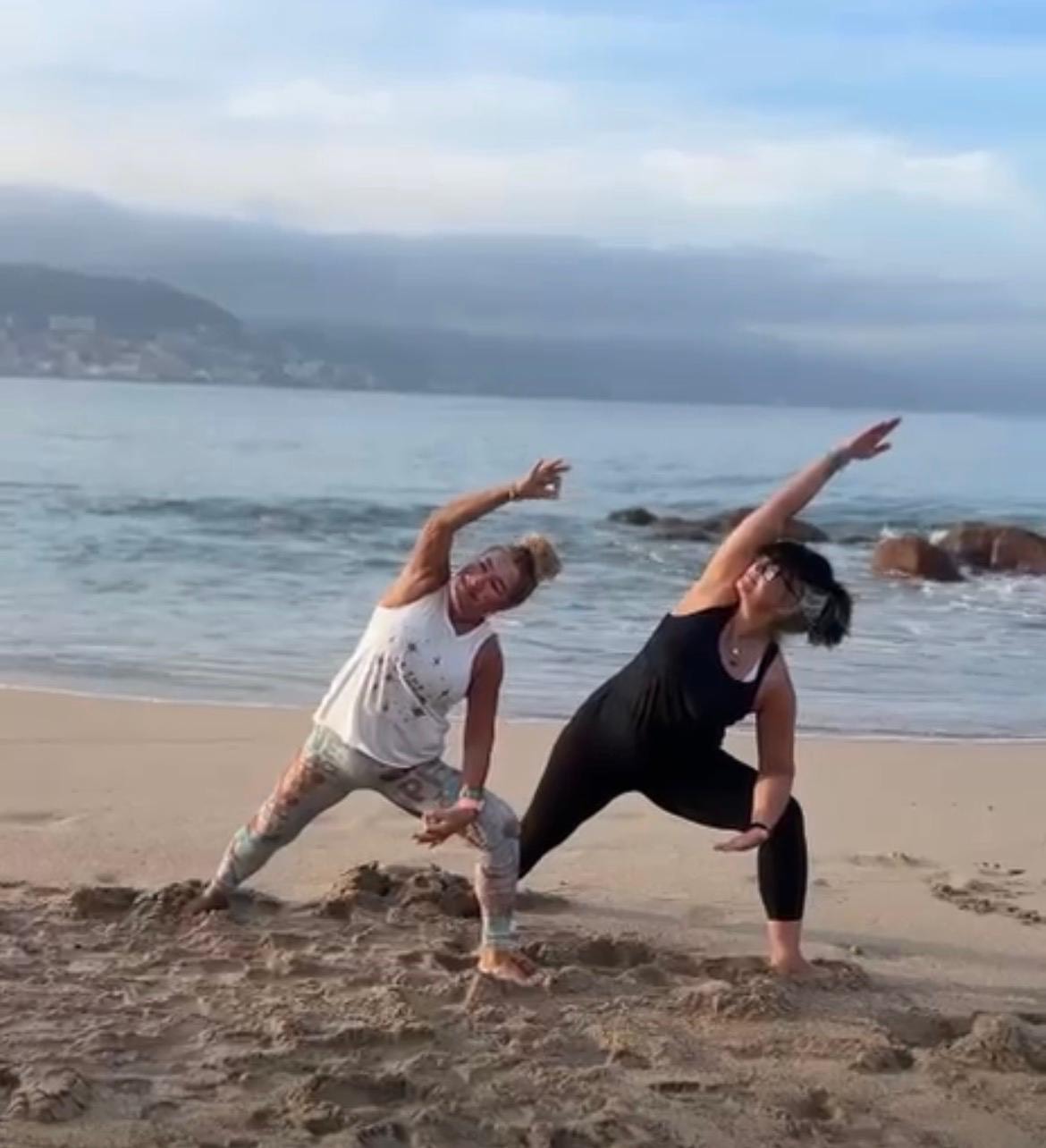
By BERNIE BELLAN Over the years we have revisited stories from time to time – to catch up with individuals who have made a mark in this city and to see where their lives have taken them since the last time we wrote about them.
One such individual is Sharon Delbridge, the youngest daughter of Sol and Rachel Fink, and younger sister to Percy, Shayla (Posen), and the late Sheldon Fink (who died all too young at the age 57 in 2021).
Myron Love has written many times about Sol and Rachel Fink, who continue to amaze for their vitality – with Sol now 101 and Rachel having just turned 99.
As Sharon notes in an email sent to me, “My parents work out everyday. Not at Rady anymore. They do exercise at home & in their condo gym (200 Tuxedo) Move their bodies daily. My mom leads her and my dad daily in movement. It’s incredible.
“They have been a huge inspiration to all of us.”
Aside from the fact that the Fink family was a very musical family, their penchant for fitness is clearly something that rubbed off on Sharon, in particular.
My own wife, Meachelle, who was quite the fitness fanatic herself in her day (not that she’s been put out to pasture quite yet), profiled Sharon for The Jewish Post & News in 2015. In that story, Sharon explained how she came to be one of the most popular and best known fitness instructors, not only at the Rady JCC – where her classes in a wide variety of different areas, were – and still are, extremely popular, but at many other venues throughout Winnipeg.
Here’s part of what Sharon told Meachelle about how she came to teach so many different types of fitness classes:
“I’ve been into fitness my whole life. I come from a very musical family but also a family that always works out. When I was in my 20s I was teaching aerobics for several years as a part-time job while in university. When I had my three children (Milan, Jared and Cassie Ackerman) I ran a hand-painted clothing business in my home called Milan Designs, and I sold to ladies’ and children’s stores all over Canada.
“I was always working out and have loved fitness classes. I went back and got more certifications in my 40s. I’m certified to teach many specialties and have been actively teaching at the Rady for over 10 years. I now specialize in women’s boutique fitness: Zumba, Yoga and Barre classes. The three specialties blend beautifully together and I have a big following of people from all over Winnipeg that come to my classes. I have every Zumba certification that’s available: Zumba, Zumba Gold (for seniors), Zumba Toning (with weights), Zumba Aqua (in water), Zumba Step and Zumba Sentao (using steppers and chairs).
“I’ve taken many yoga certifications through the past 10 years and I’ve been teaching Barre classes, which are the latest and hottest classes for women. I’m always taking new training in these three specialties to continue to stay fresh and always have new and exciting things to present to my class. That’s how I stay unique in my field. I’m always learning and always developing my classes to be the best they can be. I spend tons of time finding the best music and choreographing.
“I truly feel that if you work out and look after your body, you will always have a positive outlook on life. Exercise is a huge healer mentally and physically. I have seen so many incredible changes in women that come to my classes. They have transformed their bodies and live happier and healthier lives.”
It was a year after Meachelle’s article about Sharon that Sharon and her husband, Darcy, began going to Puerto Vallarta for the winter. As Sharon noted, “I started teaching at a Yoga studio the first winter we were here in PV. It’s easy to meet people & build community when you’re teaching snowbirds from everywhere
I love sharing my love for fitness & yoga & moving our bodies.”
But, for six years prior to making Puerto Vallarta her and Darcy’s winter home, Sharon had already been conducting annual one-week health and wellness retreats in Puerto Vallarta. She has continued to conduct those retreats every year since. The most recent retreat was held from January 25-February 1 at the Fiesta Americana All Inclusive Resort.
Here’s how Sharon describes the purpose of those retreats:
“For over 15 years, my Health & Wellness Retreat has brought together women of all ages to reconnect, recharge, and celebrate movement, friendship, and balance. Hosted at a beautiful all-inclusive resort, guests can truly make the week their own holiday experience. While primarily a women’s retreat, many now bring their husbands or partners who are welcome to participate as much or as little as they choose.
“Throughout the week, we offer seven daily classes ranging from sunrise meditation and yoga to toning, Zumba, yin yoga, and our signature Aqua Zumba — which transforms into a high-energy, joy-filled pool party. Each evening, we gather for sunset yoga and take time to celebrate the beauty of the day together.
“The retreat blends wellness with enjoyment, allowing guests to indulge in the resort’s wonderful restaurants and social atmosphere while still feeling strong, energized, and revitalized. It’s a balanced, uplifting experience where participants leave feeling nourished in body, mind, and heart, often forming lifelong friendships. This year, we were proud to welcome 40 participants.”
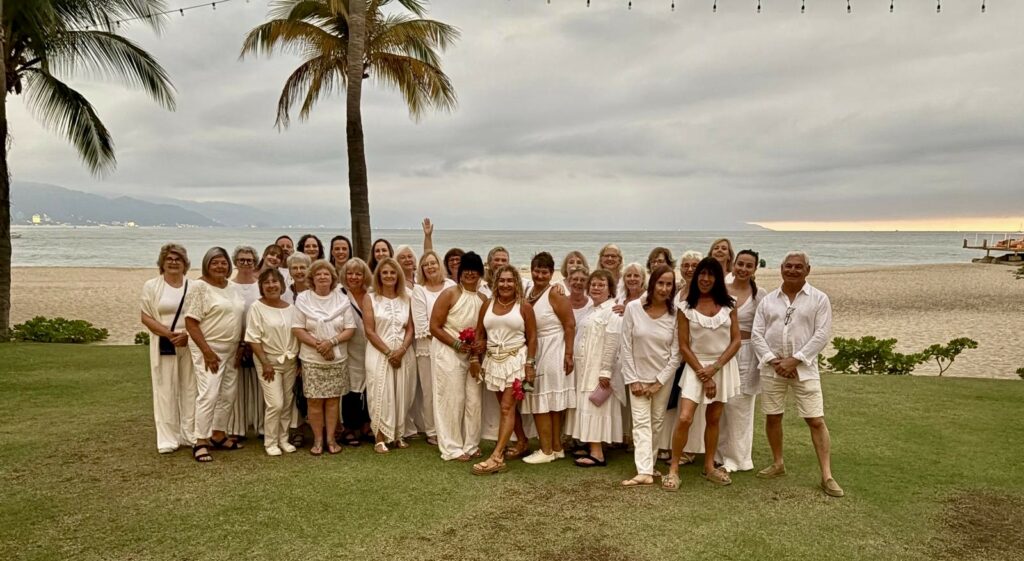
In the picture accompanying this article you might recognize several Winnipeggers. I asked Sharon how many Winnipeggers were participants in this year’s retreat?
The answer, she said, was the majority (31) were from Winnipeg, while six were from Las Vegas, one from Ottawa and two from Edmonton.
The last two years, Sharon also noted, another well known member of the Rady JCC staff, Dona Watts-Hastings, who’s a physiotherapist, also a yoga and Pilates instructor, has joined Sharon in conducting the retreat. Sharon adds that Dona’s physiotherapy clinic is inside the Rady JCC. Dona also brings some of her clients to the retreat.
I wondered though, how active Sharon is in teaching classes when she’s back in Winnipeg? Does she never tire of teaching so many classes? I wondered.
Sharon’s answer was: “Yes, I’m still in Winnipeg half of the year and I will always teach at the Rady… Zumba, sculpt , yoga & barre class – also spinning if they need me to sub. . I teach at Assiniboine park and other gyms, too. Every morning I teach and often sub other classes. Busy all spring & summer.”
Whew! It’s tiring just reading about everything Sharon does. If you would like to find out more about next year’s health & wellness retreat in Puerto Vallarta and how you might be able to join up, contact Sharon at sharon@freshsoulfitness.com.
To watch a video of what a typical day at the retreat consisted of go to freshsoulfitness
Local News
Jess Pudavick: artist and business executive
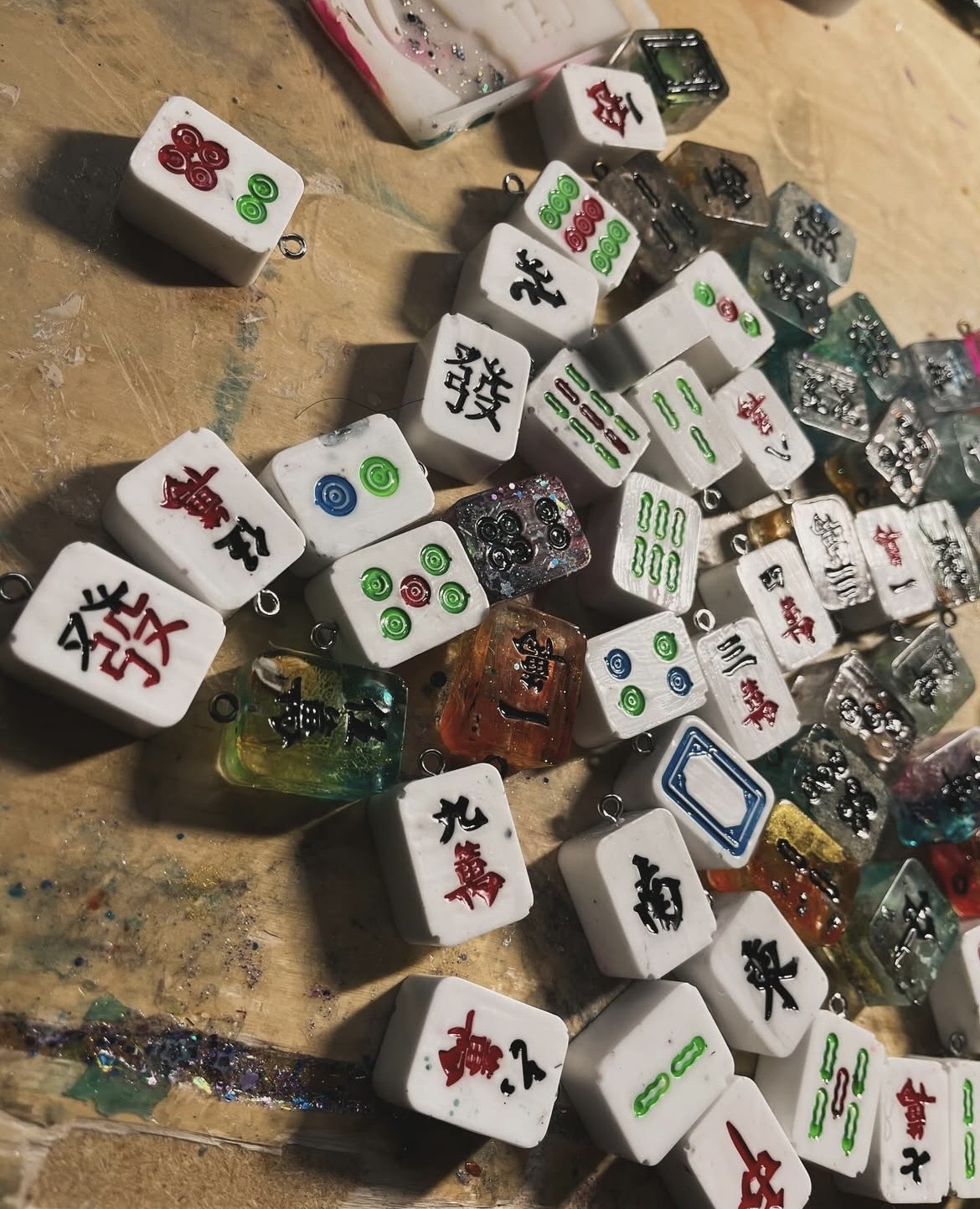
By MYRON LOVE Jess Pudavick is a rare individual in that she combines careers as an artist and a business executive.
I first became aware of Jess last summer when she was one of the artists/craftspeople with a display table at the Gwen Secter Creative Living Centre’s annual garage and craft sale. What piqued my interest was her focus on incorporating resins in her art pieces.
Last week, while interviewing Ms. Pudavick at Super-Lite Lighting on Waverley – I learned much more about the multi-talented Ms. Pudavick.
While I have a passion for art,” she notes, “I was not interested in becoming a stereotypical starving artist.”
The daughter of Stuart and Beth Pudavick joined the company (which her father acquired in the early 1980s (along with partners Simon Simkin and Allan Hochman) 17 years ago. Her brother, Ray, also joined the company 10 years ago, Jess notes.
At Super-Lite, Jess’s title is Custom Homes Lighting Consultant. She works with builders, designers and contractors to build the lighting for the home, as well as to choose the right lights for the space. She also manages the company’s social media and website.
“I enjoy working with my dad and Ray,” she says.”I also love what I do at Super-Lite. It is similar to my feelings about my art. You don’t know the end result when you start. It is nice to see something being built from nothing and seeing the end result – and knowing how happy the client is in the end.”.
As an artist, the graduate of Brock Corydon’s Hebrew Bilingual Program, Shaftesbury Collegiate and the University of Manitoba, recalls that she started at a young age. “As a kid,” she says, “I was always doodling and drawing cartoons.”
While she has worked with several different artistic media, she observes that what she likes about creating art with resins is the challenge.
“Resin is a temperamental material,” she points out. “When you start a project, you have no idea what the finished product will look like.”
She explains that there are two ways to work with resin. You can put traditional resin in a mold and wait 24 hours for the resin to dry. Or you can speed up the process by using a UV style resin and exposing the resin to UV rays.
“I prefer letting the resin dry naturally,” she says. “I find I have more control over it.”
Her resin-infused art comes in many forms. She produces earrings and necklaces, candle holders and ashtrays, dice and computer keys. She has also created resin-infused mahjong and rummikub tiles and even sets of dominoes with paw prints. A popular item, Jess says, is a custom coloured/theme wedding set of dominoes.
“People love them,” she says of the dominoes tiles.
(The latter reflects her own passion for dogs for which she is often a foster “parent”. She notes that she also creates resin-infused memory keepsake urns for the ashes/hair or fur of beloved pets – a product that is gaining popularity.)
Then there is the resin-infused coffee table that has a place of honour in her own home. “With my love of plants and resin, my partner and I took our existing coffee table, added various clippings of my own plants and created a fun resin-sealed table,” she recounts. “It really looks cool. It is unique. it attracts visitors’ interest. Every time I look at it, I see something different.”
Jess reports that generally sells her works of art through craft sales and her Instagram page (@thejesso09) for between $10 and $30. Her major source of sales though, she adds, is through word of mouth.
But Pudavick avers that she doesn’t do her art with an eye to sales.
“I create for myself, not for the approval of others. I find it relaxing – a good way to reduce stress. It’s also rewarding to see that others want something you have created.”
She strongly believes that enjoying your work is an important element in being happy. Equally important, she notes, – both in business and art – is to have satisfied customers.


